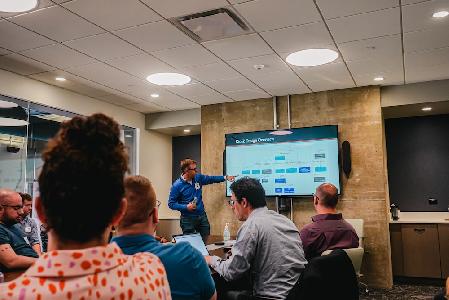Technical.ly’s Editorial Calendar explores a different topic each month. The August 2018 topic is Technologists of Color. These stories highlight the contributions of technologists and entrepreneurs of color across Technical.ly’s five markets.
Initially, I didn’t want to write this article. The prompt was to write about a technical challenge. To be precise, I did not want to write a technical article at all. Why?
Trolls.
Negativity.
Mansplaining.
Fear of judgement, just to name a few.
So I decided to anyway. Because fear of online harassment is also a technical challenge. And I don’t feel that we talk about it nearly enough.
According to a 2017 survey by Atlassian, a staggering 76 percent of technical jobs are held by men and Black and Latino people make up just 5 percent of the tech workforce. This is indeed a technical problem, a huge one at that. Knowing this, one might begin to understand why someone who does not fit those characteristics would hesitate when writing a technical post for an audience so very different from them.
From being on the receiving end of mansplaining, all the way to getting doxed and receiving threats of violence, cis and trans women and non-binary people, especially those of color, are constantly having to do extra work to ensure their safety, online and off.
An example of this is taking a different route to work, to minimize catcalling. Well, we literally have to do this online too. Most of my friends have blogs on their own domains. Most friends that have posts on third-party blogging sites turn off guests’ ability to comment. They’ve turned off commenting on videos of talks they’ve given or refrain from even applying to speak at events.
I’ve noticed the more visible a trans person, woman, person of color, or non-binary person (especially those that sit at multiple intersections of the aforementioned) is in tech, the more harassment they tend to deal with. It’s deeply unfair and I admire those that continuously share their knowledge with the tech industry despite the animosity they face. It’s an industry that seems so undeserving of their generosity.
I am reminded of Tiffany Mikell during her incredible talk at #WSC2018conf, where she shared that learning how software systems worked helped her better understand systems of oppression. She also mentioned that in turn, if you’re of a marginalized group, you’re uniquely positioned and qualified to build better systems because you understand how they work and how they haven’t been working.
Why isn’t the tech industry making a more inclusive space for these voices?
We have so much talent and unique experience to offer, and we deserve a space to be able to do so. It should not have to be up to women and non-binary folks, especially those of color, to find their own solutions for the harassment and violence perpetrated against them. We shouldn’t have to hide ourselves, our work and our intellect to be able to be safe and respected online.
For all of the above stated reasons and experiences, it can definitely be off-putting and demotivating to write technical blog posts. It has been for me.
However, I am delighted by initiatives led by visible folks in tech, encouraging beginners to share their technical content. As Stephanie Hulburt tweets, “Having a nice comment at the beginning of your career can go a long way in making you feel like you can achieve your dreams. Much more powerful than just a technical critique.”
People that have been traditionally left out of the tech industry deserve the space to learn, and if they should want to do so publicly, it needn’t always be a critique. I love learning transparently, and as I learn to code I like to tweet about the challenges that crop up. A lot of times it is not as much a cry for help as it is a vehicle to normalize what I’m experiencing; a way to challenge imposter syndrome.
Having an inclusive community and support group makes a difference. Using platforms with a clear code of conduct that will act on reports of abuse helps mitigate these negative experiences. Dev.to, an online community “where programmers share ideas and help each other grow,” is a great example of this.
When I began learning to code, I found Girl Develop It. At Girl Develop It, all questions are welcome and the class environment is structured to be free of judgement. Learning to code is already challenging enough; the learning environment itself should not pose even more difficulties. GDI works on breaking down those learning barriers so that learning to code can be accessible to as many people as possible.
Girl Develop It board member and San Francisco chapter lead Brenda Jin said it best:
“We [Girl Develop It] also reverse the stereotypes that lead women to believe that technology is not for them. We create an environment that’s positive and safe for risk-taking and questions. Our classes are a majority of women, which means that students get to see women learning, teaching, and leading. Confidence and representation are so important to being able to see yourself succeeding”
It bears repeating that being visible and doing good work doesn’t shield folks from harassment. Time and time again, I’ve seen that it simply opens them up to more abuse. The tech sector has a collective responsibility to combat these problems. Just as much as tech wants to solve the slippery slope of JS frameworks, it should apply that same energy towards these issues. I hope that after reading this article you make a promise to do so. And I promise to write more.
Join the conversation!
Find news, events, jobs and people who share your interests on Technical.ly's open community Slack

Philly daily roundup: Student-made college cost app; Central High is robotics world champ; Internet subsidy expiration looms

Philly daily roundup: Earth Day glossary; Gen AI's energy cost; Biotech incubator in Horsham

Philly daily roundup: Women's health startup wins pitch; $204M for internet access; 'GamingWalls' for sports venues


